PHOTOS: New Rijeka Urban Parks Just One Lasting Legacy of ECoC 2020
January 27, 2021 – Rising sharply up into the foothills, little space in the expansion of Rijeka was left for green and community recreation areas. New Rijeka urban parks address the issue and are just one lasting legacy of ECoC 2020
The preparations for Rijeka European Capital of Culture 2020 were years in the making. Community consultations and contributions for every aspect of the arts, each venue and city institution put their enthusiasm behind the project. And that's without even mentioning all the international contributors whose work was commissioned. It really did feel like the whole city had come together to show the best of themselves in Rijeka's special year. Except, 2020 turned out to be special for all the wrong reasons.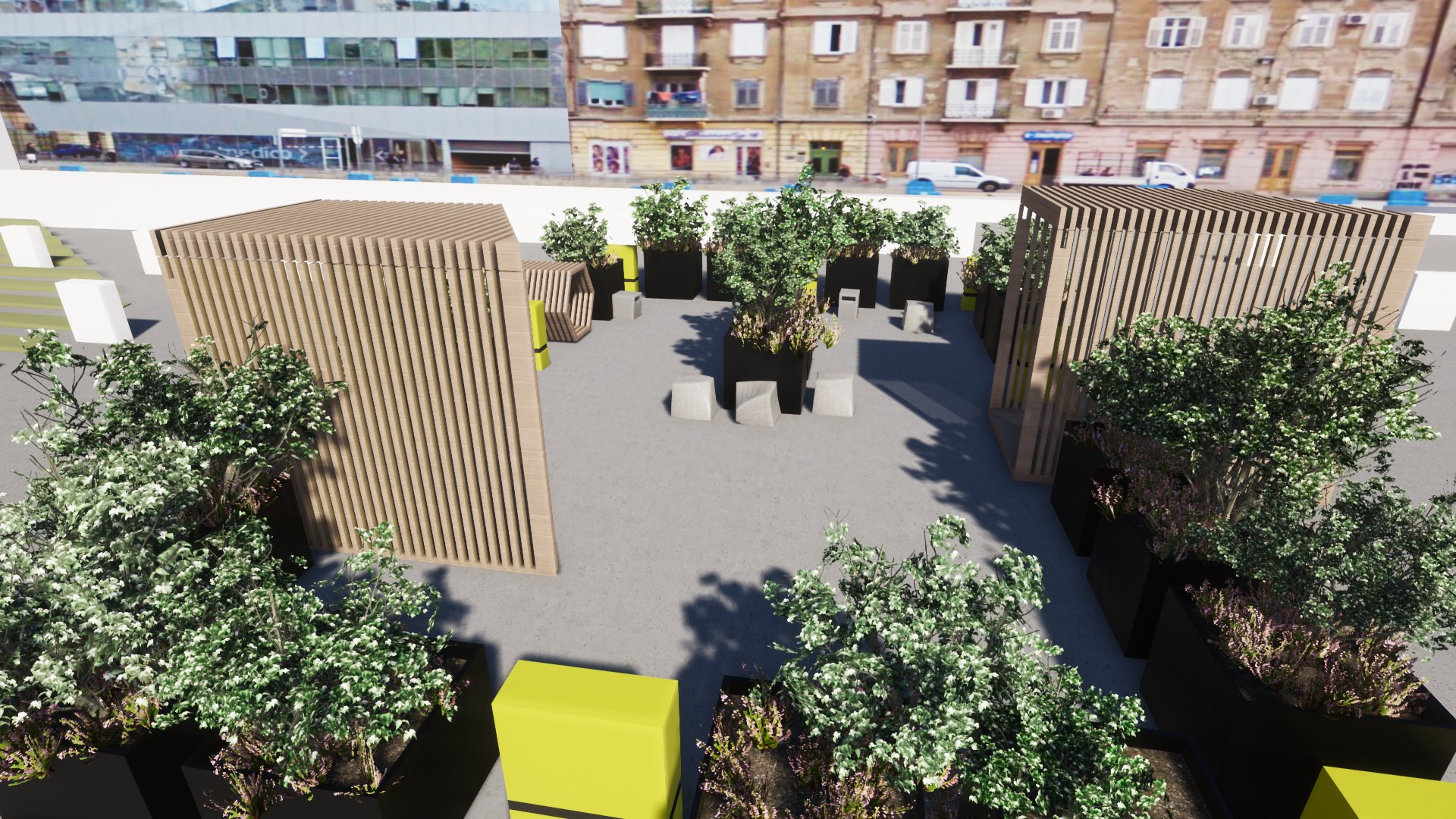
European authorities granted the European Capital of Culture status to Rijeka for extra months in order to allow them to complete some programs halted by the pandemic. Not that it much helped increase the footfall the vast project was meant to attract to the Kvarner capital's streets. Instead, the streets lay bereft of guests, visited only by Rijeka residents. But, that's not such a bad thing.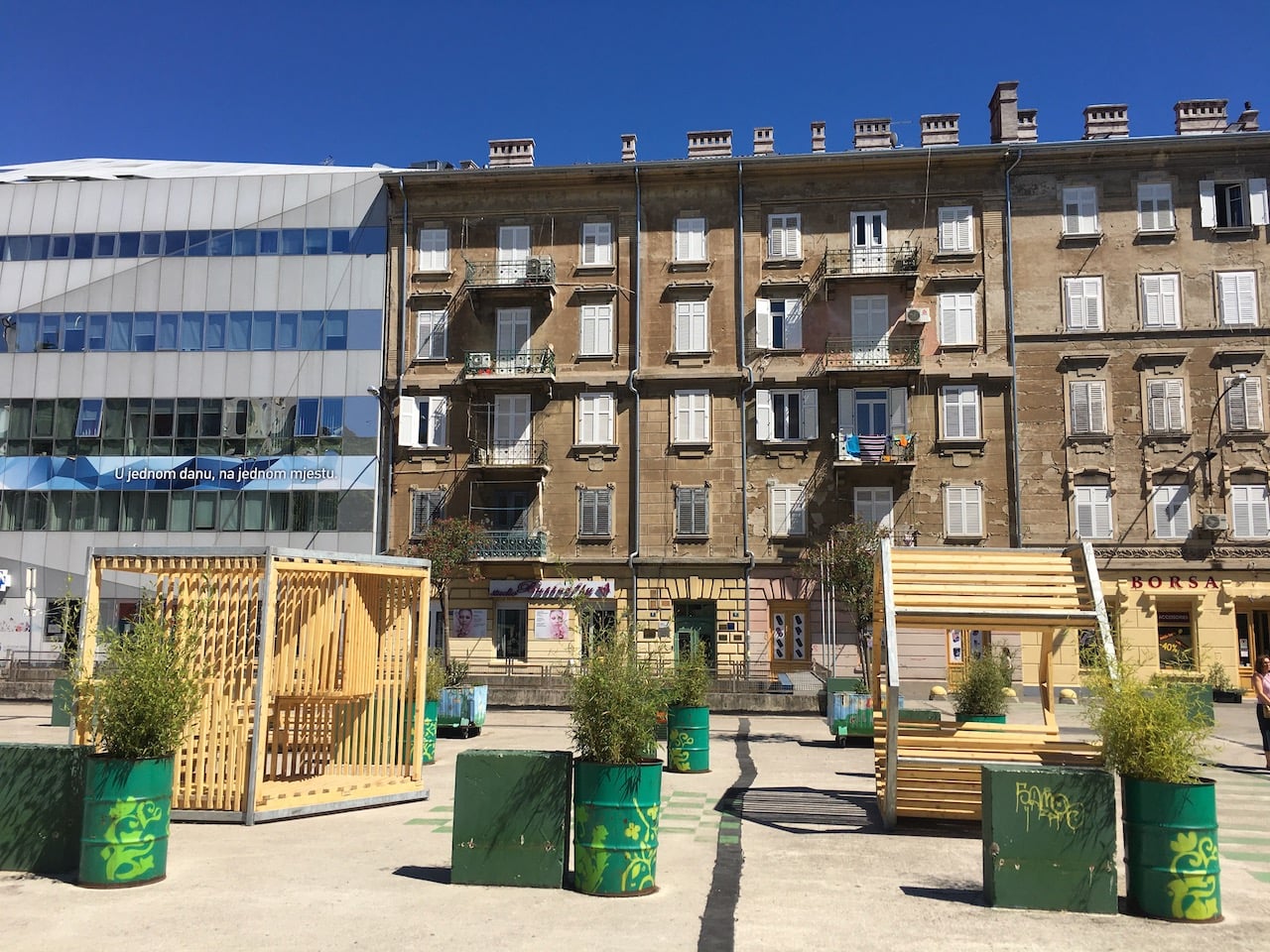
The Capital of Culture has never been awarded solely to help a city attract visitors. Nor is it ever intended to make its mark over just one year. A lasting legacy for the city's current and future residents is perhaps the most essential element of the event. And, though crippled by Corona, Rijeka European Capital of Culture 2020 is staying true to its promise to do so. New Rijeka urban parks and public recreation areas are just some of the benefits ECoC 2020 will leave behind.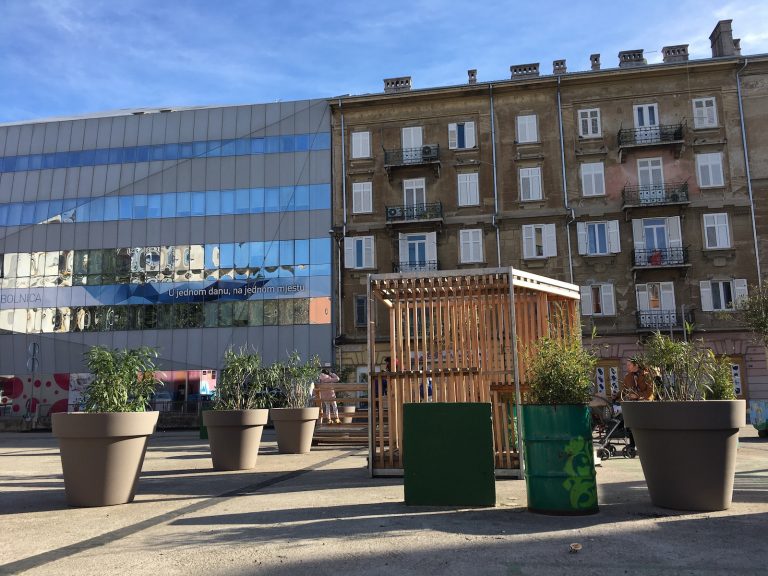
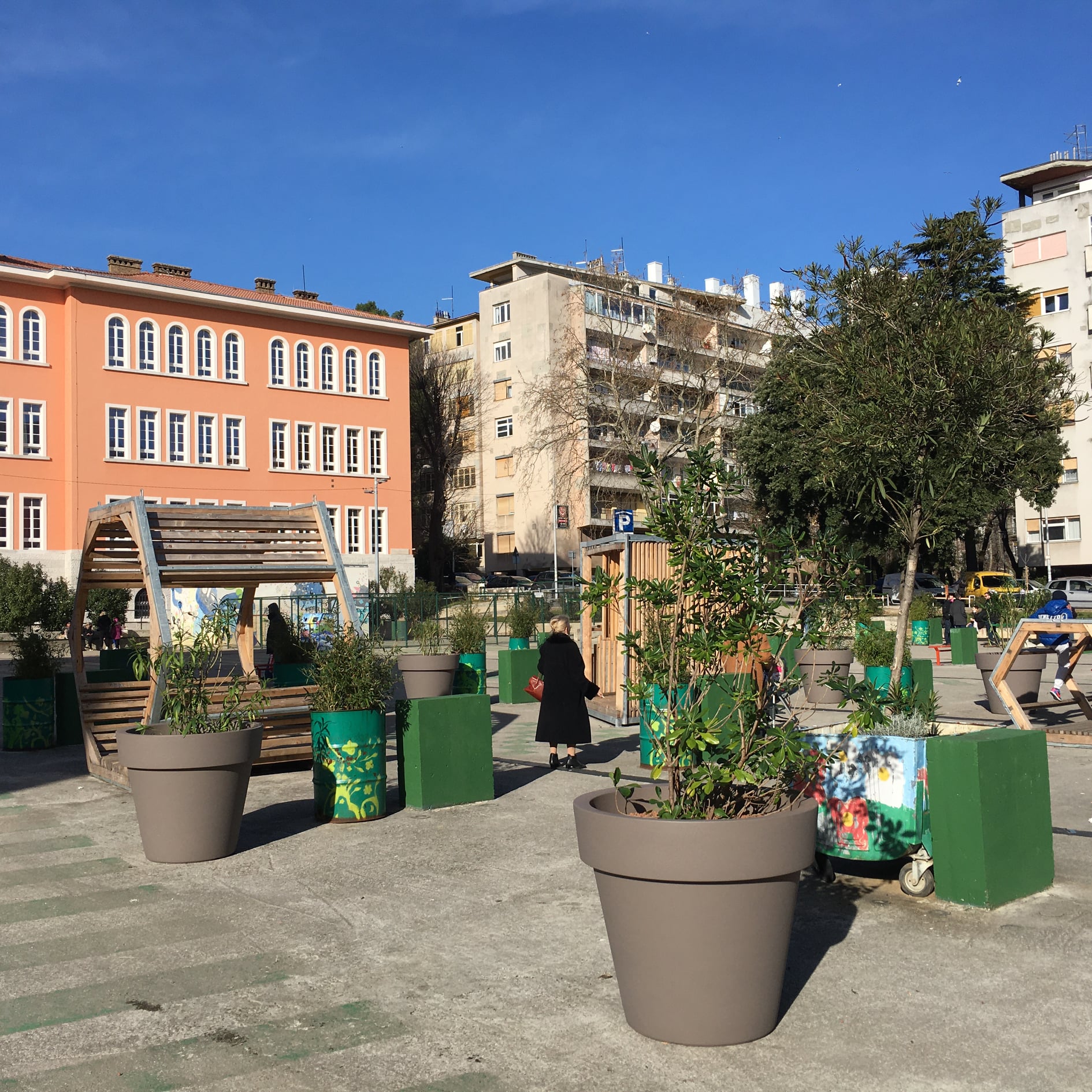
Rijeka is a great city. But, it's a weird place. An anomaly on the Croatian coast, it boasts none of the quaint olde worlde architecture you usually find around the Mediterranean, Croatia included. It's grand Austro-Hungarian facades and palaces are much more like the Croatian capital. Behind them the city rises sharply up into the foothills, modern residential blocks shooting skywards and peering over the centre below. As Rijeka has grown like moss up this hillside, little room has been left for greenery and areas of recreation. Goodness knows, the best spot you might find for a picnic in Rijeka is the cemetery! (Kozala – actually, as far as places full of dead people go, it's actually very nice)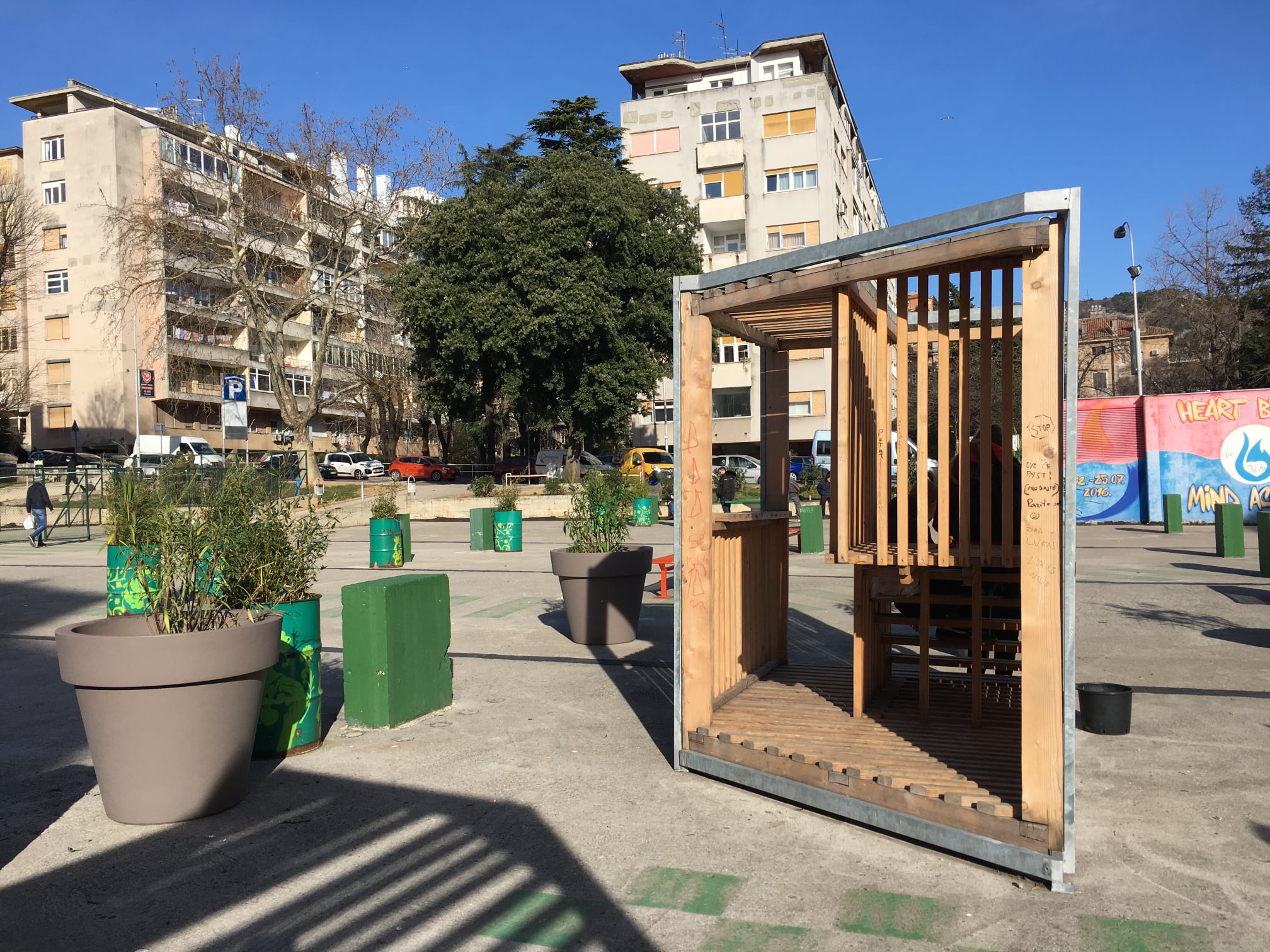
The new Rijeka urban parks try to address the imbalance of work to recreation space city residents have. While it may not be possible to create a vast landscape of lawns and a forest of trees in the city centre, the new Rijeka urban parks and public areas look to use modern solutions and the places they have, to create spaces where everyone can socialise, play, relax or meet up.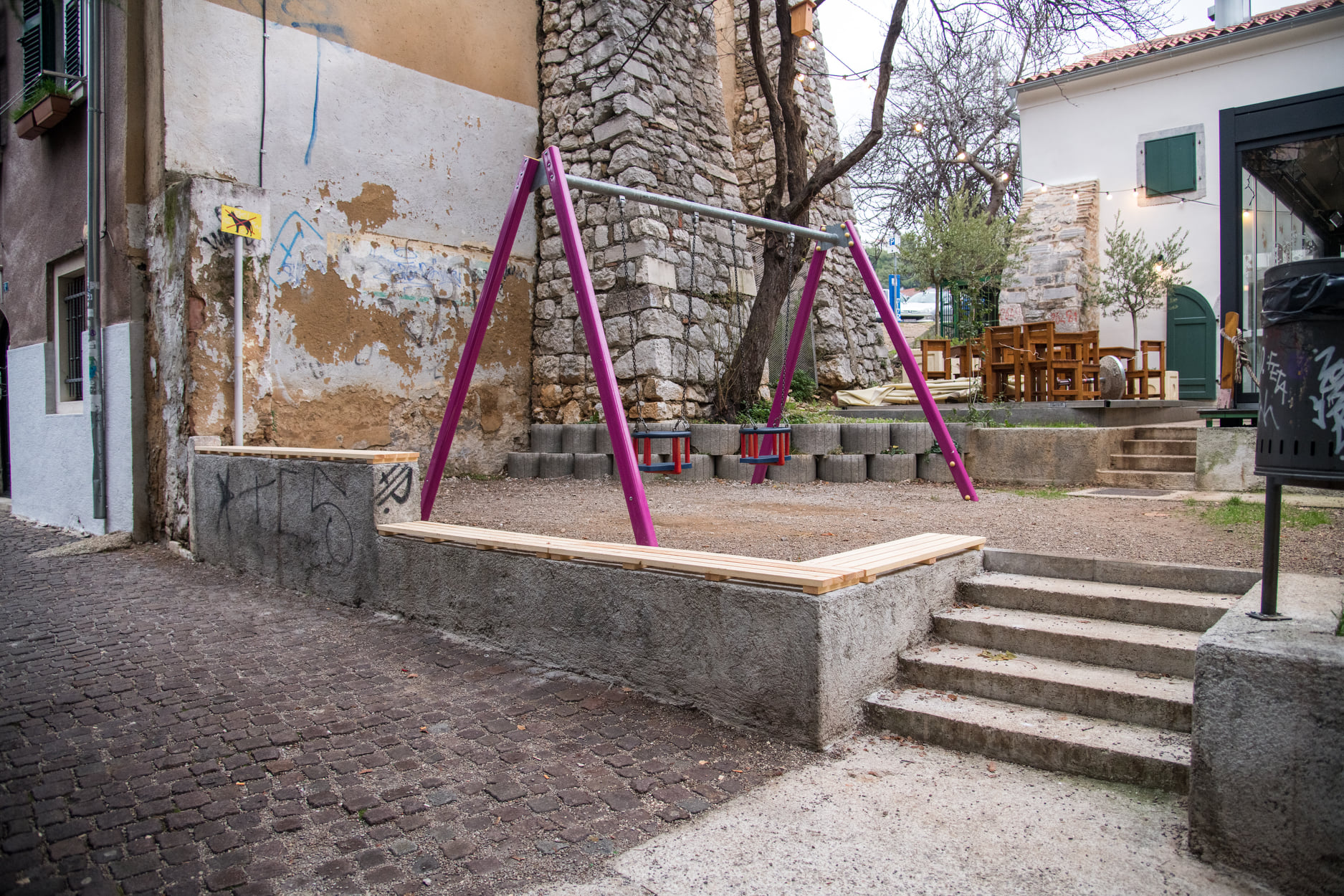
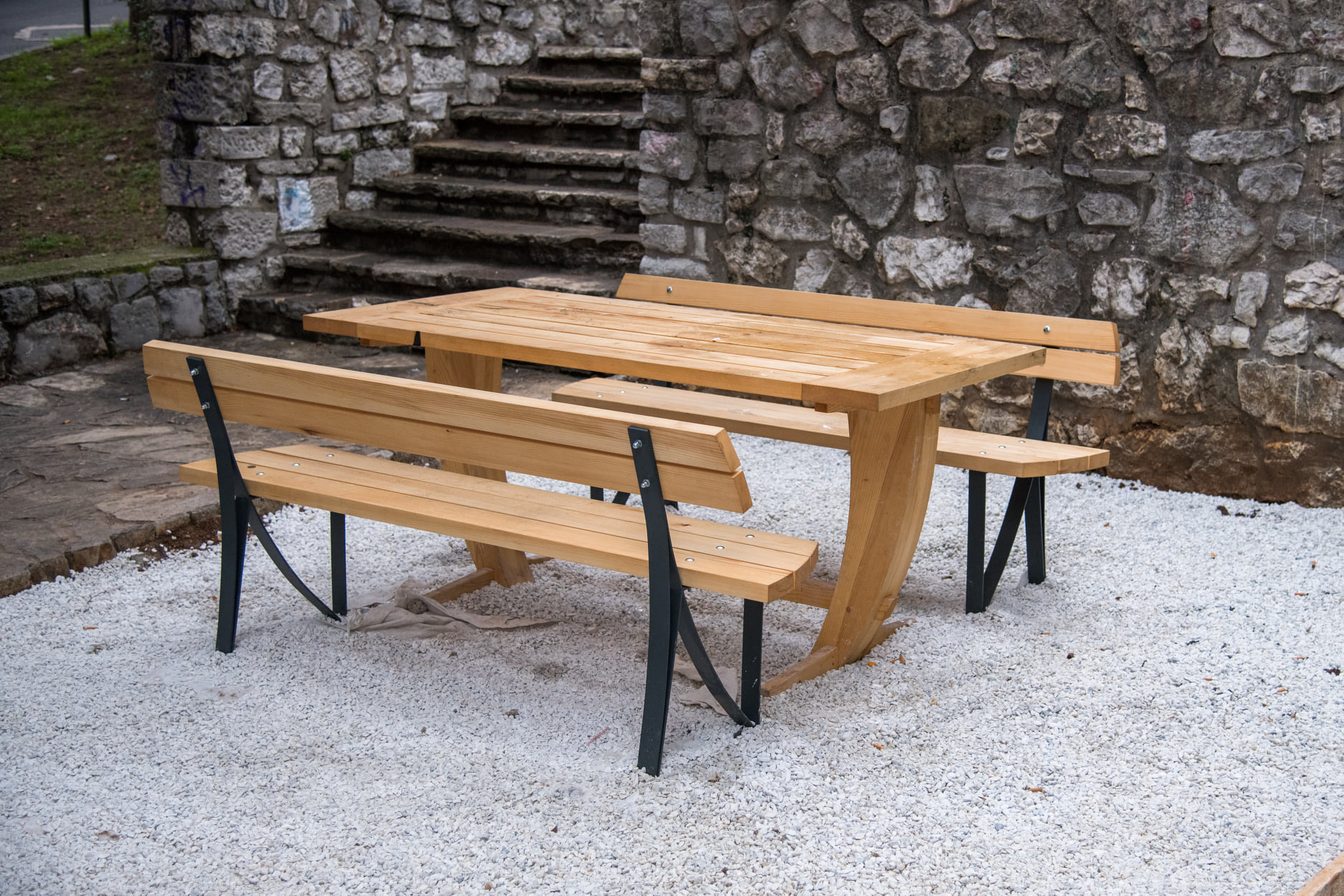
Under several different programs within European Capital of Culture 2020, members of the Association for the Promotion of the Quality of Urban Life 'Urbani separe' worked on the new Rijeka urban parks in July 2020 and again between December 2020 and January 2021. In a relatively short space of time, we think they've done a great job.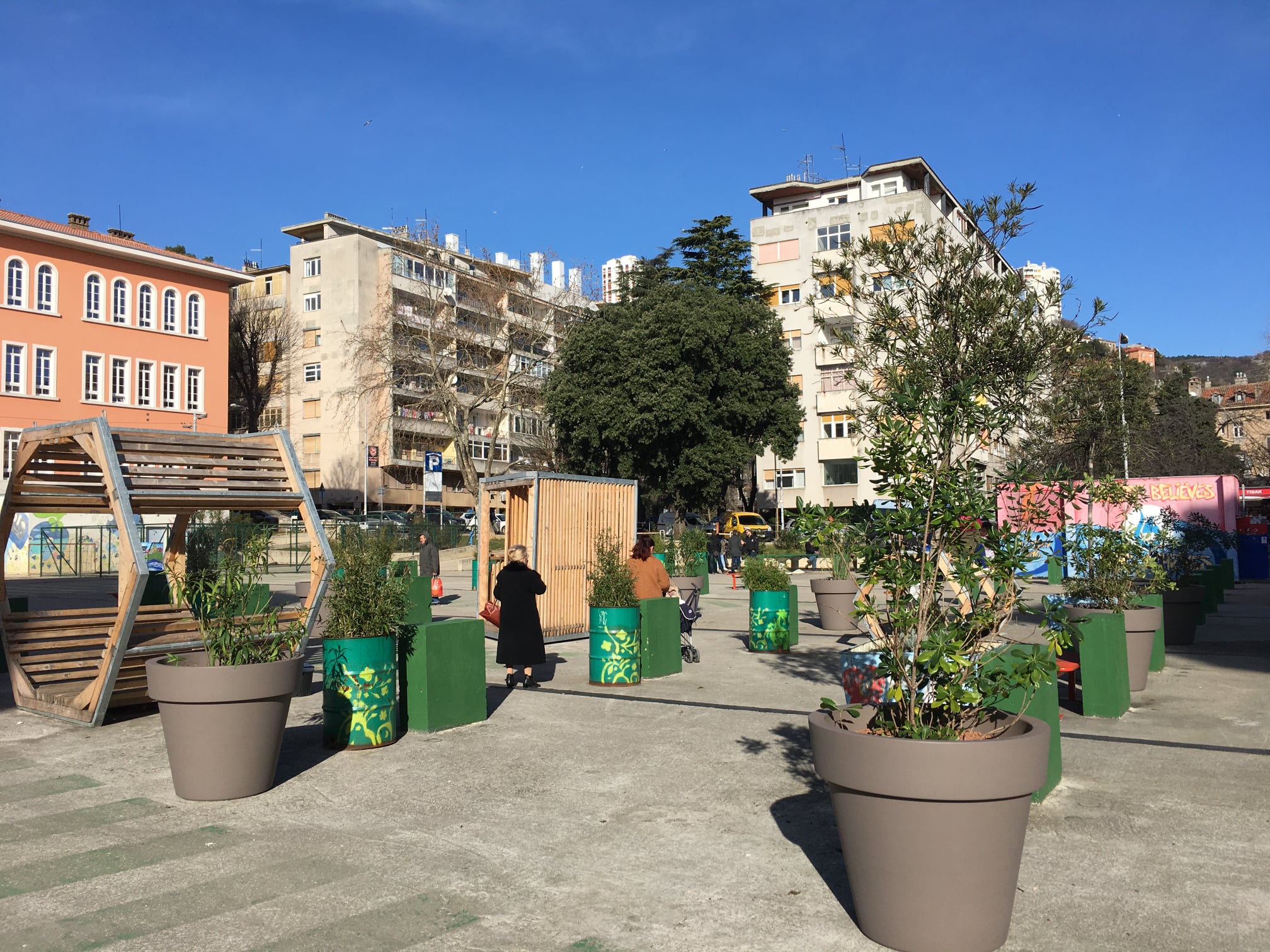
All images © Urbani separe / Rijeka 2020
Giant Red Star Art Installation Appears Over Rijeka Skyline
September 20, 2020 - The giant red star art installation was today placed on a skyscraper, marking the day the Anti-fascist State Council for the National Liberation of Croatia returned Rijeka to its rightful place, as a city of Croatia
A giant red star today appeared over the skyline in the coastal city of Rijeka. Made from shards of bright red glass, the art installation sparkled in the late summer sun as it peered over the edge of a prominent city centre building. The installation is titled Monument to Red Rijeka - a self-defense monument and is by artist Nemanja Cvijanović.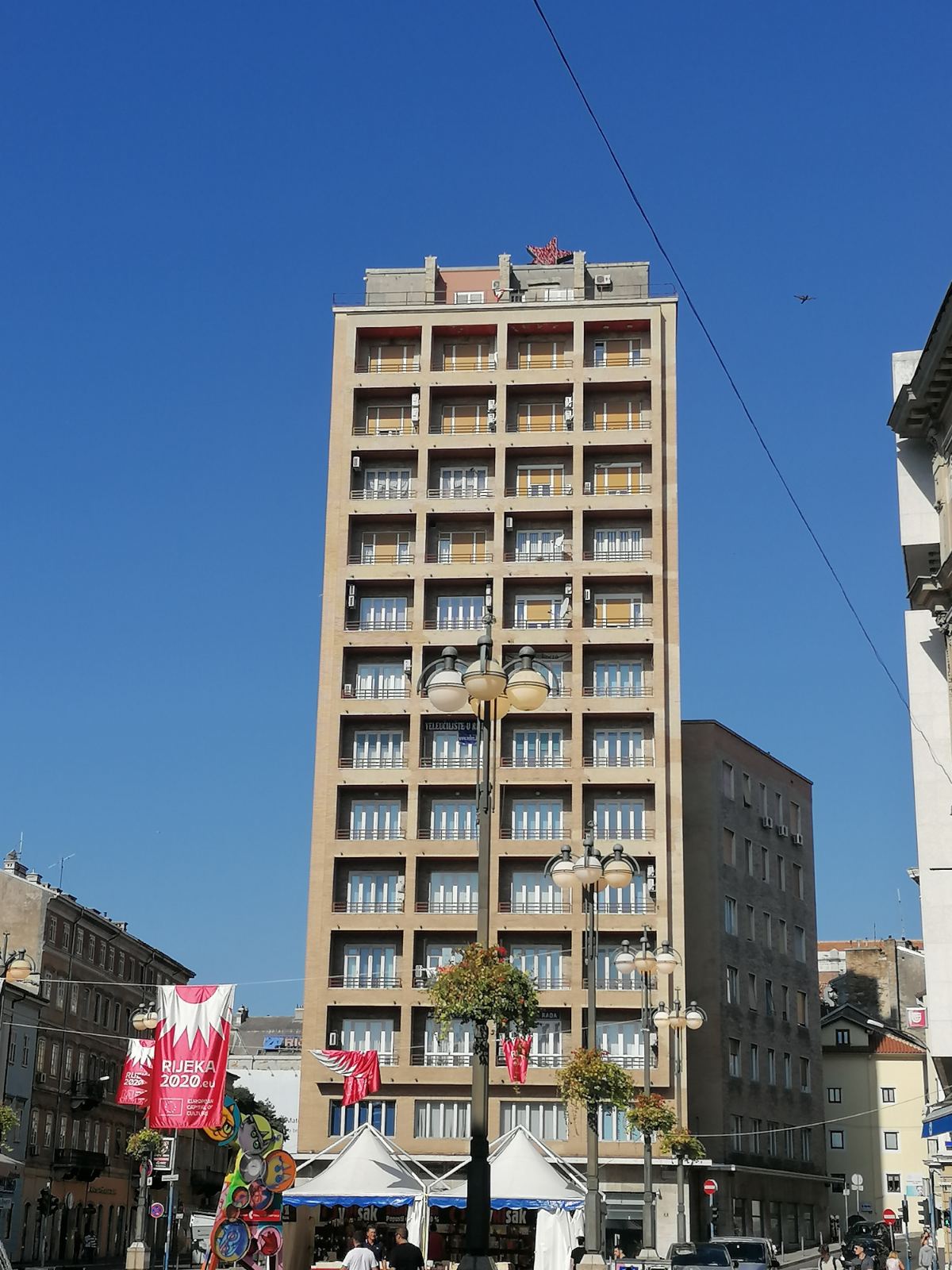
The red star was positioned on the very day that the Anti-fascist State Council for the National Liberation of Croatia returned Rijeka to its rightful place, as a city of Croatia. Rijeka, along with a huge amount of Croatian territory including Dalmatia and Istria had previously been ceded to Italy during World War II by the Independent State of Croatia (NDH).
The NDH was a puppet state of Nazi Germany and fascist Italy and one of the most-lethal regimes of the 20th century. Between 1941 and 1945 they established 22 concentration camps within the paltry territory their fascist masters allowed them to keep. The regime targeted Serbs, Jews and Roma as part of a large-scale campaign of genocide, as well as anti-fascist or dissident Croats and Muslims. Although concentration camps were originally invented by the British in Africa during the Second Boer War (1899 – 1902), the Second World War was the first time such camps were expressly built as death camps. The Independent State of Croatia (NDH) is the only state in the world to have ever had concentration camps just for children. They were located in Jastrebarsko and Sisak.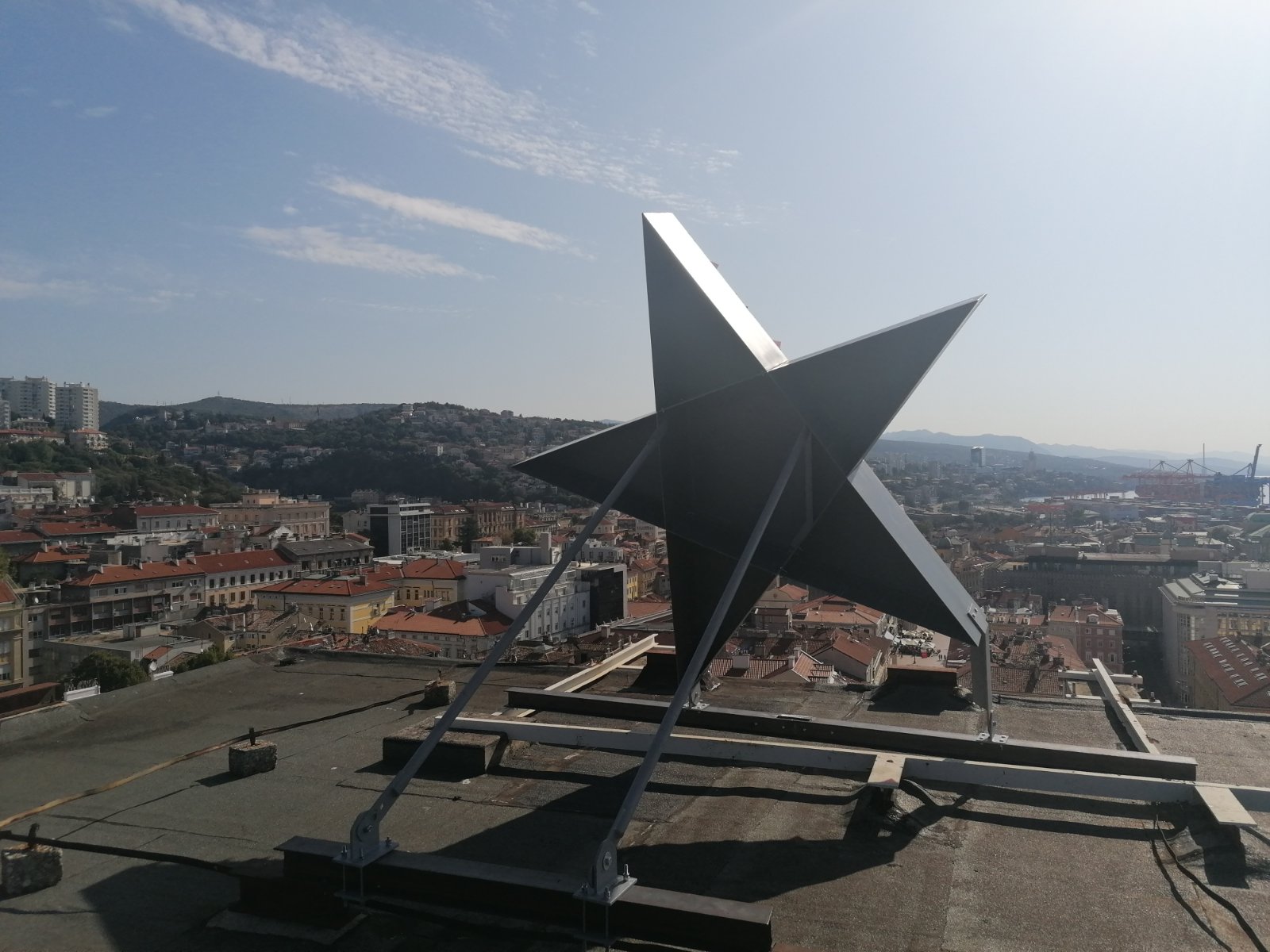
Rijeka's red star art installation is part of the city's programme for its designated year as European Capital of Culture. An essential element of Capital of Culture is the celebration of diversity. In Rijeka today, people of many different ethnicities and religions co-exist peacefully. Such a situation would never have been possible nor permitted under fascist rule.
The multi-ethnic and multi-cultural aspects of life in Rijeka today can be traced back to the day that the Anti-fascist State Council for the National Liberation of Croatia returned Rijeka to Croatia and subsequently created a state for all Croatians. It is therefore understandable that the city and its residents should wish to commemorate its liberation and return to Croatia in this way. The red star was the symbol on the flag of the Anti-fascist State Council for the National Liberation of Croatia.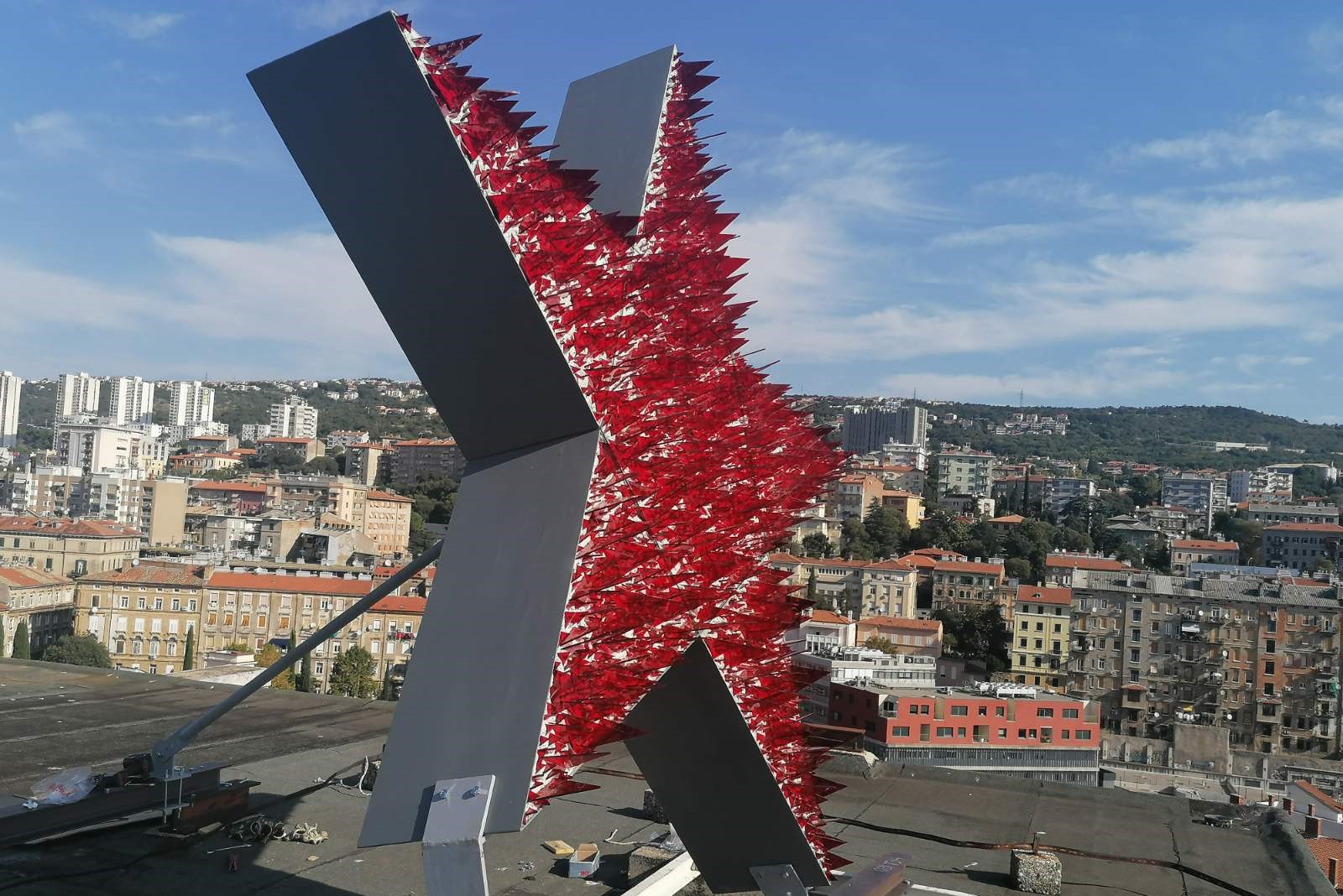
The red star symbol remains a controversial one amongst many Croatians as it is inextricably linked to communism. While the people of Rijeka have the right to commemorate their return to Croatia in any way they wish, some Croatians who don't live in Rijeka - or who don't even live in Croatia - are not happy when symbols of communism are used to celebrate liberation from fascism. Perhaps it should be for the people of Rijeka to decide how they wish to mark such a day and those who live in other territories can stick to deciding how their own local manifestations should look?
One group of angry men took to the streets of Rijeka in protest during the same afternoon the star was positioned. Some of them were seen to carry fascist Croatian flags which bore the symbol used by the NDH. Like the swastika and other Nazi symbols, this fascist flag is outlawed in many places such as Austria and Germany.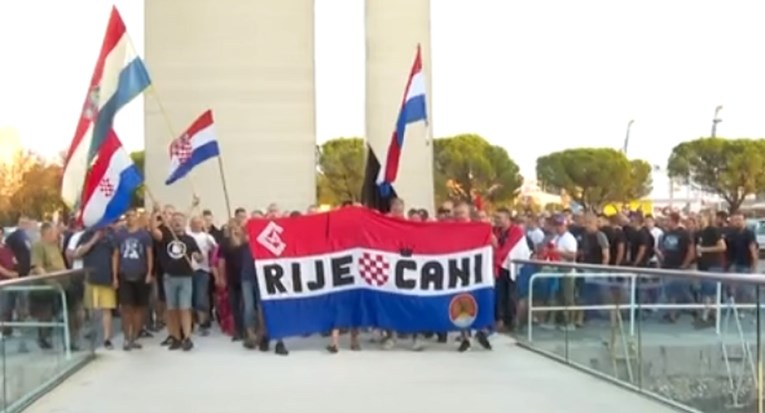
All photos © Rijeka 2020 (except screenshot from RTL television)
For the latest travel info, bookmark our main travel info article, which is updated daily.
Read the Croatian Travel Update in your language - now available in 24 languages
18th Liburnia Film Festival Begins In Opatija
August 23, 2020 – 21 films are in competition at Liburnia Film Festival, the country's leading festival promoting Croatian documentaries.
Liburnia Film Festival (LFF) returns this week to showcase the very best in Croatian documentary films. Held in the beautiful surroundings of Opatija, this is the 18th annual occurrence for Croatia's original documentary festival.
Opatija's small Summer Stage will host the festival's main competition programme, with an off-programme taking place at Villa Antonio in Opatija you will find. 21 films are this year competing for jury and audience awards, of which 9 are receiving their premieres at Liburnia Film Festival.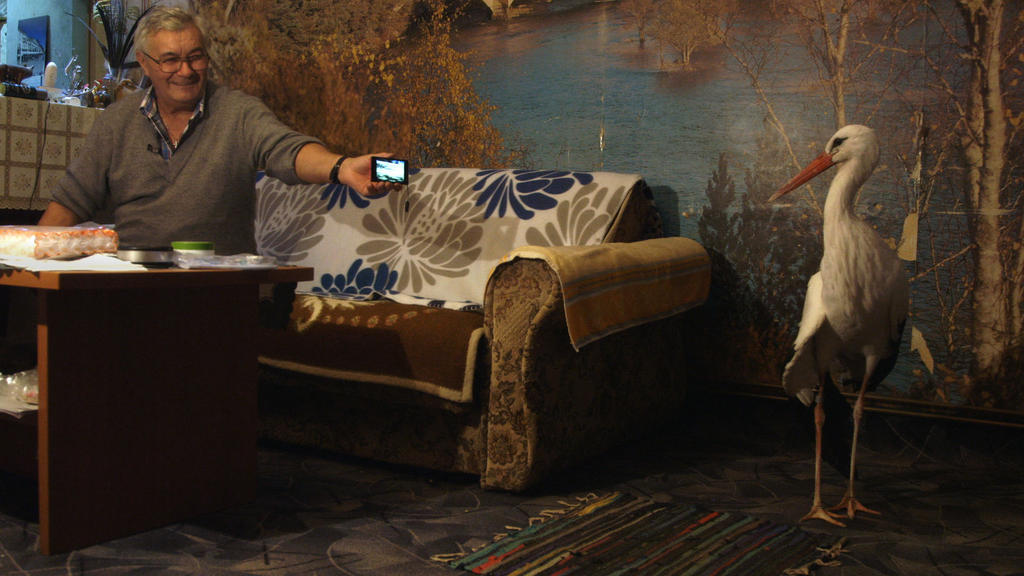
A scene from 2020 feature-length documentary 'Storkman' by Tomislav Jelinčić. The film follows Slavonski Brod widower Stjepan Vokić and his two famous, adopted house guests, the storks Malena and Klepetan. The film opens outdoor screenings on Monday 24 August at 20.15 © Transmedia Production
This year's international film programme is titled 'State of Emergency' and features 7 movies which focus on extremist movements in Europe. Part of this year's Liburnia Film Festival schedule is being run in conjunction with Rijeka Capital of Culture 2020.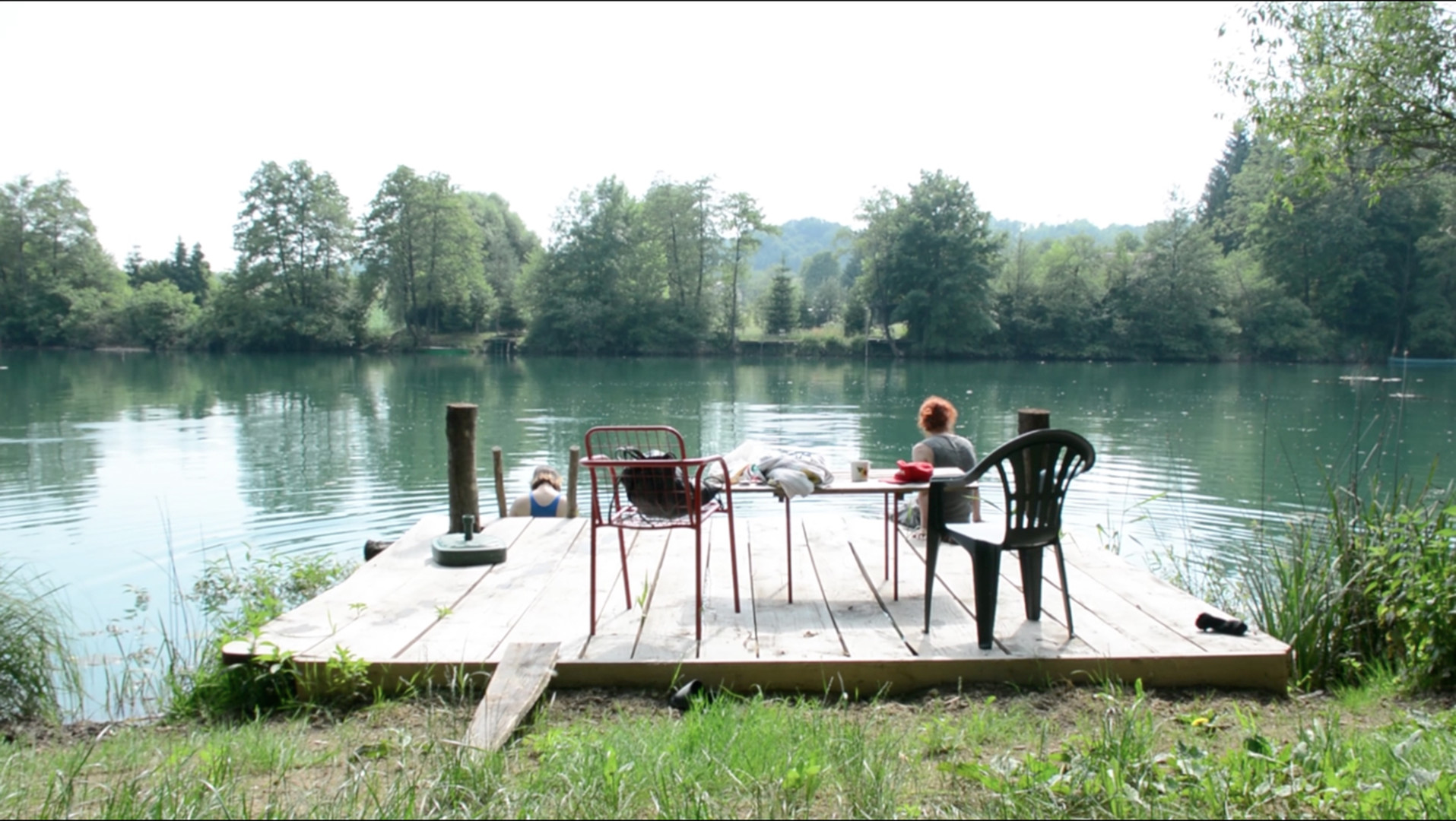
A scene from 2020 film 'My Universe' by Zagreb-based filmmaker Yuliya Molina. Russian immigrant mother Galja and her feminist street artist daughter Nastja appear to be worlds apart, but actually have more in common than they'd like to admit. The 28-minute movie won Best Slovenian Film at the recent FEKK Film Festival in Ljubljana and will be screened outdoors, after 22.30, on Monday 24 August © Akademija dramske umjetnosti Zagreb
Educational programmes and discussions with filmmakers in competition make up the afternoon sections of the festival. Screenings begin at around 18.00 each day at Villa Antonio for the off-programme, with outdoor screenings usually beginning at 20.15. The festival is adhering to epidemiological guidelines and as a result, there are a more limited number of seats than in previous years.
The Liburnia Film Festival begins on the evening of Monday 24 August and ends late on the night of Friday 28 August.
EU To Extend Rijeka Capital Of Culture For 4 Months
August 19, 2020 – The European Union Commission proposal will give Rijeka Capital Of Culture more time to finish its grand plans
The European Commission today said they are proposing to extend ECoC status to Rijeka for four extra months. Authorities recognised that the city's long-planned Rijeka Capital Of Culture programme was not able to run due to the coronavirus pandemic.
Earlier this year, most public institutions – museums, galleries, theatres, music venues, bars, nightclubs, restaurants, hotels and all places of public gathering – were closed in Croatia for many weeks. Much of the Rijeka Capital Of Culture calendar of events had to be postponed or cancelled. Some artists due to visit Rijeka Capital Of Culture were also unable to reach the city. The programme all but ceased between March 2020 and June 2020.
However, some of the programme has since been successfully reinstated. The European Commission proposal may give the city more time to finish its grand plans. The offer is also to be extended to the city of Galway in Ireland, which shares Capital of Culture status with Rijeka this year. The proposed extension would mean Rijeka Capital Of Culture retains the title until April 30 2021. This would give the city one more opportunity to mark ECoC at its biggest annual event, the monstrous Rijeka Carnival, which concludes at the end of February.
Rijeka 'I Miss You' Film Takes Second Place at Berlin Festival
March 9, 2020 – The promotional film “Rijeka - I Miss You” took second place at the 20th anniversary festival of The Golden City Gate in Berlin, the Rijeka Tourist Board reported on Monday.
Normally, awards are handed out at this festival as part of the ITB World Tourism Exchange in Berlin, but as ITB was cancelled this year due to the coronavirus outbreak, so was the award ceremony, according to Novi List.
Second Prize in ‘City International’ Category
The promotional film received second prize in the "City International" category among promotional films at the Golden City Gate competitions. A large number of well-known destinations worldwide were submitted for the awards, and were reviewed and evaluated by a jury of 45 members, including specialists in their respective professions and representatives of travel agencies, professors, students, directors and administrations, ministries and artists.
The film was produced by Balduči Film and the Rijeka Tourist Board. The producer/screenwriter is Spomenka Saraga and the director is Herve Tirmarche.
This promotional film was shot at numerous attractive locations which represent the metropolis as a year-round tourist and city break destination. The film takes viewers through the highlights, from the Trsat castle and museums to the top restaurants and one of the most beautiful fish markets in Europe, according to the Rijeka Tourist Board.
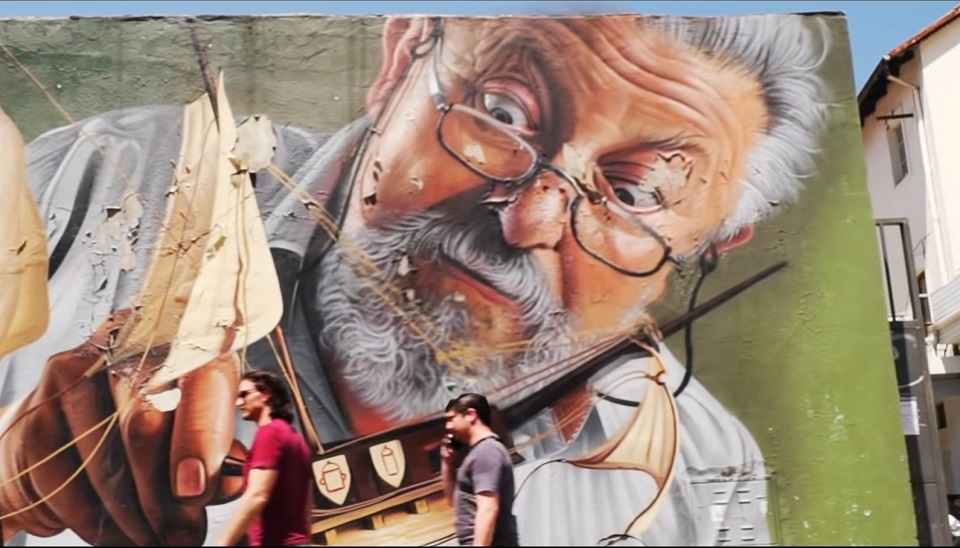
Rijeka: Top Ten Croatia 2020 Destination
In January, Rijeka was among the top 10 destinations of Croatia for tourist traffic. With outstanding tourism numbers, the city began 2020 by ranking second highest in the Kvarner area. In January, Rijeka reported 17,830 overnight stays, an increase of 11 percent over 2019.
In addition, the European organization European Best Destinations has put the Croatian port in the list of the top 10 European cities to be visited in 2020.
Most overnights were spent by guests from the surrounding region. On average they stayed three days, which is evidence that Rijeka is becoming a city break destination and more attractive to a growing number of foreign and domestic tourists.
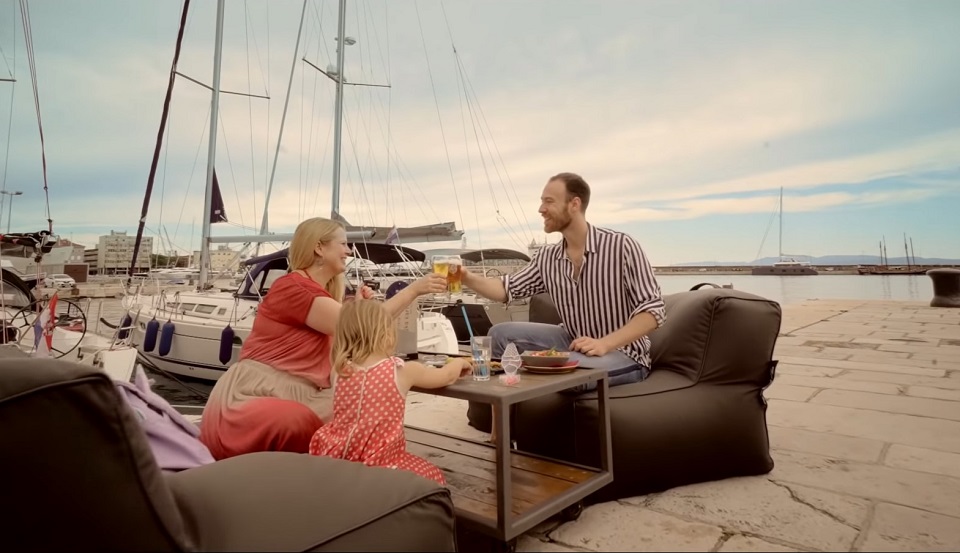
Greatest Growth: 19 to 30 Tourist Age Group
In January, tourists from the 19 to 30 age group spent the greatest number of overnights and accounted for 29.6 percent of total overnight stays.
Rijeka also entered the list of the top 10 destinations in Croatia in terms of tourist traffic in private accommodation and ranked fourth behind Zagreb, Split and Dubrovnik.
Follow our Travel page and this page for Total Croatia News articles about Rijeka European Capital of Culture. The website for the Rijeka Tourist Board can be accessed here, Croatian National Tourist Board here and Kvarner County Tourism Office here.
Rijeka Environmental Group Installs Sea 'Trash Can' At Croatian Port
The first Seabin device, a floating “trash can” and seawater filter, was installed on Friday in the passenger port of Rijeka.
Rijeka Based Initiative S.E.A. Donated Seabin Device
The Rijeka-based Initiative S.E.A. (Save, Embrace, Achieve) donated the Seabin device to the Port Authority of Rijeka to raise awareness about the need to protect and conserve the marine environment. The initiative also introduces sustainable solutions for the use and management of marine life as one of its most valuable resources.
Seabin is a floating trash can which constantly filters seawater, collecting plastics, microplastics, detergents, oils and other materials from the surface, preventing them from drifting off to the open sea and harming marine flora and fauna, according to Morski HR on February 10, 2020.
“The initiative was founded to primarily to raise awareness about the need to change environmental attitudes, especially in our oceans, and to foster further debate on the ‘green transition’ which is beginning to take hold in response to the global environmental crisis. The focus of the initiative is to dispose of plastics and micro plastics. It also promotes implementing the most advanced green methods, practices and technologies for better environmental management and utilization of its resources,” they explained.
Seabin Acts as Floating ‘Trash Can’ in Marinas, Yacht Clubs, Ports
According to their website, the Seabin V5 unit is a ‘trash skimmer’ designed to be installed in water at marinas, yacht clubs, ports and any body of water with a calm environment and available suitable services.
The unit acts as a floating trash can which skims the water surface by pumping water into the device. The Seabin V5 can intercept floating debris, macro and micro plastics and microfibers with an additional filter. By acting as a trash skimmer, the Seabin V5 is also able to clean the water from contaminated organic material including leaves and seaweed.
The Seabin V5 can be equipped with oil absorbent pads that absorb petroleum-based surface oils and detergent which is predominant in most marinas worldwide.
Surface Water Passes Through Catch Bag At 25,000 Liters Per Hour
Water is sucked in from the surface where it passes through a catch bag inside Seabin. The device is equipped with submersible water pump capable of displacing 25,000 liters per hour and can be plugged directly into either a 110V or 220V outlet. The water is then pumped back into the marina leaving litter and debris trapped in the catch bag.
The Seabin V5 can catch an estimated 3.9 kilograms of floating debris per day or 1.4 tons per year (depending on weather and debris volumes) including micro plastics as small as 2 millimeters.
Follow our Lifestyle page for more information on environmental initiatives in Croatia. More information about the Seabin V5 can be found on their website and Facebook page.
Croatian Director of Netflix 'The Paper' on Final Season: Dalibor Matanić
Art or culture must reflect society and the moment in which we live, according to Dalibor Matanić, talented Croatian director of the world-acclaimed series “The Paper” (Novine). The series, based in Rijeka, can be streamed worldwide on Netflix and is available with English subtitles.
Every form of culture, including provocation, must be aimed at establishing dialogue. Creating a culture of dialogue is extremely important, to get out of the divisions and move away from where you were in '91. I want the most important question to be where you will be in 2020. It is a much more important question for today and for the society in which we live. Lots of noise and negative reactions are fueled by those who would like to control culture, and we know that this is not turning out very well, the director reveals to Danijela Bauk/Novi List January 21, 2020.
Third Final Season of ‘The Paper’ Premieres in Rijeka January 25
Dalibor Matanić has his hands full these days. He and his team for the acclaimed series "The Paper", are looking forward to the Rijeka premiere of the third and final season, will take place on Friday, January 25 at Art-Kino. And then another completely new challenge awaits him - directing the main opening program for Rijeka 2020 - the European Capital of Culture at the port of Rijeka, or the "Opera Industrial" program which will include more than 120 performers. There is also the recent premiere of "Zora" (Dawn), the sequel to the award-winning "Zvizdan" (High Sun), or the second part of the trilogy "Sunce" (Sun). He is also preparing a play "Berlin" for the Croatian National Theater. Recently, for the third time, he became a father. He and wife, actress Helena Minić, welcomed a son, who they named Neo.
But let's start at the beginning. The premiere of the first two episodes of the final season of "The Paper" will take place on January 25 at Art-Kino in Rijeka.
“We will show the first two episodes of the final and third season of ‘The Paper’. Everything is ready to go. I anticipate that this third season will be a very interesting and unexpected for our audience, as we probe deeper into the characters, their inner world, and deal with this final account of corruption and transition which we introduced during the first season. The main theme of the third season is the judiciary, in the first season we covered the media, in the second politics. But this time we are focusing on the characters, they are the ones who judge things, who carry us forward. This third season is focused mostly on characters, and less on action, the characters move into confrontations with their opponents, and with themselves. We go into the depths of the characters, and analyze them from the inside,” Matanić reveals.
This way of working, the in-depth character analyses was first made possible by a great acting team, but also by screenwriter Ivica Đikić, who upgraded and expanded the script.
Film Productions Like Jazz Sessions or Improvisations
“Our film productions sometimes seem like jazz sessions, or music improvisations during which just about everyone, including those in front and behind the cameras, give everything they have. Above everything else, Rijeka has enjoyed a place in the spotlight, as the city plays an important role in all three seasons of the series. I can truly say that we have had optimal conditions, a great cast with up to 90 actors per season, a city with a special vibe, the right atmosphere which resembled a music session. We also have a great production crew. It has been an ideal work culture and one of mutual respect. We felt the progress from season to season and were constantly discovering new ‘languages’”.
“That’s why I think the series is so successful too. We did not work according to an established format and did not strictly adhere to what was written in the script but were open letting the scenes evolve. It all coincided, with the script by Ivica Đikić, the producers from Drugi plan (The Second Plan), and fantastic actors led by Branka Katić and Dragan Despot. Ivica Đikić 's flexible scriptwriting allowed us to work this way and allowed us to improvise.”
‘The Paper’ Storyline Reflects Real World Croatian Situations
“There are screenwriters who don't allow interventions and stick to their script like a Bible. We did things differently and constantly updated both the story and the characters. That's why I believe we have had such a positive audience response. And that is why the audience discovered similarities to the real world during our second season. This is our reality, and some of the motives and characters remind the audience of real events and people. In the third season, we completely delve into the characters, discover their various layers, inner emotions, and I hope that the audience will find this approach interesting too. Especially since they are already familiar with the characters; we will give insight into some of their inner, hidden ‘worlds’. We’ll allow them to discover that all the characters are made of flesh and blood, and that nothing is black and white. We also find that humans often act like animals. I directed the third season, or the season of characters, as a kind of western – a modern western with skirmishes between characters along with the internal struggles of characters,” says the award-winning Croatian director.
And audiences have been responding to this high-caliber work. Rarely has any Croatian series sparked such widespread interest, with audiences eagerly expecting each new season. And the bar has been set high, as the first two successful seasons significantly raised expectations. After all, the increased competition of world series productions has raised their overall quality, so the audience is more educated, has higher expectations and recognizes quality output.
Croatian Corruption Rarely Portrayed in Bold Courageous Manner
“We really have an army of fans, not just casual viewers, but loyal fans who closely follow each detail of every episode of every season of the series. Our domestic audience, as well as those who watch the series from abroad, recognize that there are not very many brave series out there like ‘The Paper’, and foreign critics have often pointed this out. There are few attempts so courageous to portray corruption and transition in this manner. After all, ‘The Paper’ is not an easy series to watch, you could go to the bathroom and lose a story line which is critical for understanding the entire series. The audience is not stupid or simple-minded. They expect more, especially because they also follow foreign series productions. They see what is being filmed worldwide and compare us to foreign productions even though we are not on an equal footing with them. We are proud of our consistency ever since our very first season.”
“We have said that this series was a trilogy and we sticking to that plan. There won’t be any sequels after this season, although I personally believe that the whole team wouldn’t mind working on this set until they retire. This way of working, the everyday creative energy, which has filled us all with pleasure and happiness, is not common scenario as far as I know. We have worked together for four years and have spent about a year together. This must be sustainable, because it is also a kind of creative madness, like an amusement park or children's playground. But this set, vibe and atmosphere allowed us to shoot this series. After we finished filming, I said that I hope to have another opportunity to direct this kind of project, God willing.”
Overseeing Rijeka European Capital of Culture Program
Matanić will also oversee the opening of the ECOC (European Capital of Culture) at Rijeka's port on February 1.
“Directing the main program for the opening of the European Capital of Culture is actually a kind of continuation of the story we began with the promotional movie ‘Port of Diversity’. They asked me to give them a hand, and after all, these are friends and people I have already worked with. That moment, that collective awareness that Croatia is getting the European Capital of Culture recognition is very important. I think that Rijeka's ECOC is being managed by a great team of professionals who are not only working on an opening program, but also one that will run through the entire year.”
“Yes, I cheered for Rijeka, although some of other candidate cities were great too. And I'm glad that Rijeka won. Now we need to capitalize on this victory, and awaken awareness that culture is for everyone. We need build a bridge to the audience, so that they perceive that something truly important is happening. We must educate and open minds, because culture must not be self-sacrificing or incomprehensible. After all, the basis of the ECOC's philosophy is to bring culture from institutions to the streets and bring it closer an audience who might not otherwise be reached. One needs to find a key, a code for how to bring people to the message behind a work of art.
Art or Culture Must Reflect the Society We Live In
That key, or that code is important. Lately, a lot of ruckus has been raised about the erection of Kožarić's "Therefore Hay" and the announcement of the placement of a star on top of the Rijeka Skyscraper, as a temporary art installation by Nemanja Cvijanović. Matanić himself knows a lot about this kind of ruckus. At one time, his video for the ECOC’s "Port of Diversity" provoked strong negative reactions. So, does he believe that art must be just beautiful and enjoyable, or does it still have to question society and the present, especially in projects for the ECOC?
“I am the wrong person to ask if the culture should be just comfortable or cultivated. Art or culture must above all reflect the society and the moment in which we live. Every form of culture, including provocation, must be aimed at establishing a dialogue. Safe culture doesn’t accomplish anything, modern art must respond to all good and bad in society, and to every anomaly. But again, what is extremely important is that dialogue respects on both sides; then that dialogue will accomplish something good. Creating a culture of dialogue is extremely important, to escape the divisions and move away from where you were in '91. I want the most important question to be where you will be in 2020. It is a much more important question for today and for the society in which we live. Lots of shouting and negative reactions are fueled by those who would like to control culture, and we know that this is not turning out very well.”
Film ‘Zora’ Premiere and Fall Debut at Croatian National Theatre
After the premiere of "The Paper" and the opening of the ECOC; Matanić is also set to premiere the movie "Zora" (Dawn), the sequel to "Zvizdan" (High Sun), which won the jury award at the 2015 Cannes Film Festival in the competition "Izvjestan pogled” (Un Certain Regard).
“’Zora’, the second part of the ‘Sunce’ trilogy, will premiere this summer. Personally, I can say that ‘Zvizdan’ was a more accessible film, much more than ‘Zora’ will be. ‘Zora’ is a more avantgarde and moves radically forward. We deal with all the obstacles that can destroy love, and love must be strengthened to defeat cynicism and negative social movements. We are also concerned with people, individuals and society. The work is set in a bland future, a few years ahead of the present and ‘anticipates’ some things that might happen if we didn't respect human postulates,” says Matanić.
But that's not all. At the end of the year, his first theatre production will premiere at the HNK (Croatian National Theatre) in Zagreb, where he will stage the play "Berlin" by Ivor Martinić.
“It is also a sequel to the play ‘The Damned’ after the cult film of the same name by Luchino Visconti produced at SNG Maribor, whose dramatization was also written by Ivor Martinić. In this play we will point out that fascism is dangerous and that we must not dance around this issue in contemporary culture. Croatian fascism is the greatest evil that impacted our country and I find such ideas unacceptable today. It is our responsibility to make this country better, to make Croatian society better. Artists and culturalists are not businessmen, economists or politicians. We do not have a lot of power, but we can point out problems and anomalies, and I think that is our responsibility. And the audience responds well to these efforts. I believe that we all desire deep within ourselves to live in a more normal and peaceful place, rather than in an atmosphere of constant tension, or Balkan cauldron where something is constantly cooking and boiling,” Matanić concludes.
‘The Paper’ Has Promoted Rijeka As Filming Location
“The Paper” series has done a great deal, not only for Croatia, but also for the worldwide promotion of Rijeka. The series is currently available worldwide through Netflix's streaming service and locations in Rijeka and surrounding areas are presented not only to audiences, but to worldwide production companies and filmmakers, who are increasingly interested in filming in and around the city.
“A lot of foreigners and journalists have come to Rijeka after watching ‘The Paper’ and we know this firsthand. We have filmed and showcased Rijeka like no one ever has before. Therefore, it has become a unique and attractive location for foreign productions, which are increasingly being filmed in the city and surrounding locations. Rarely does a city or region have proximity to the sea and mountains, unusual city vistas and attractive natural sites. If we were to film for ten more seasons, we would still not be able show all the locations and views that Rijeka has to offer. It is very interesting that a city that is not very large offers so much diversity, and that makes it quite fascinating. I think it's simply a well-deserved compliment to the city.”
“Recently, Mercedes was shooting an advertisement at the same location we used for ‘The Paper’. But beyond the fantastic micro-locations and different vistas, there is this warmth of the city and its residents who accept everyone with open arms. We have always felt more than welcome, and that is very important. We never felt that we were disturbing anyone. But this is Rijeka, it's always been like that. Yet it is a multicultural city that accepts difference and that means everything. We have really felt this in the best possible way. I know what I'm talking about, because I've shot in several other Croatian cities and towns.”
Follow our Lifestyle page for more information and updates on talented Croatian directors and artists. For more information on Dalibor Matanić, check out his YouTube page.
500 Performers at Inauguration of Rijeka as European Capital of Culture
ZAGREB, January 18, 2020 - Around 500 performers will stage 70 events at 30 venues in the northern Adriatic city of Rijeka on 1 February 2020 as part of a day-long programme inaugurating that port city as the European Capital of Culture, and the central event will be Opera Industriale, to be staged at the city port.
Rijeka Mayor Vojko Obersnel told a news conference on Saturday that on 1 February Rijeka would be one of the most entertaining and one of the liveliest cities, not only in Croatia but in Europe as well.
More than 40 artistic organisations, associations, businesses, individuals and institutions will be taking part in the programme, he said.
Obersnel added that he was glad about the enthusiasm demonstrated by citizens and their response to the public invitation to participate in the opening ceremony.
Emina Višnić, director of the Rijeka 2020 company, which is the organiser of the European Capital of Culture project, called on Rijeka residents and guests to attend the opening ceremony, which will also be taking place on January 31 and February 2.
The opening ceremonies will start in the morning of 1 February with a get-together at the city's Skradin bar and city bus tours, with actresses Tanja Smoje and Jelena Lopatić as guides. This will be followed by numerous music and dance performances, open-air exhibitions and other events in the city's streets and squares.
The official part of the inauguration will be held at the Croatian National Threatre (HNK) in the afternoon, with a representative of the European Commission presenting city officials with a European Capital of Culture plaque. Members of the diplomatic corps, government officials, 16 EU culture ministers and representatives of previous and future European Capitals of Culture are expected to attend.
The central event of the opening ceremony, Opera Industriale, to be stage-directed by Dalibor Matanić, brings sound, music and noise as well as effects resulting from a combination of light and darkness and strong symbols of Rijeka and Europe. It will involve more than 120 performers as well as the audience, as several hundred bells will be distributed to parents with children at one moment so they can join in the programme.
The slogan of Rijeka as the European Capital of Culture 2020 is "The Port of Diversity". The city shares the designation with the Irish town of Galway.
More Rijeka news can be found in the Lifestyle section.
Culture Minister Refuses to Censor “Communist” Sculpture
ZAGREB, January 15, 2020 - Culture Minister Nina Obuljen Koržinek said on Wednesday she would not be the one to decide what an artist would think or do, thus responding to a query about a five-pointed star sculpture to be displayed as part of the Rijeka 2020 - European Capital of Culture project.
"In 1990, we decided to live in a state which would be democratic and which would not censor artists," she told MP Zlatko Hasanbegović during Question Time in parliament, adding that "artists will decide what an artist in Croatia will think, do, how they will act, not a minister or a commissary."
Hasanbegović complained about plans to place a concrete five-pointed star sculpture by Nemanja Cvijanovic on a high-rise in Rijeka.
The minister said that under the rules of the European Capital of Culture project, the city chose its artistic director and project team and they conceived the programme.
"As to whether something will or won't be done to a protected culture monument, if we receive a request, we will consider it, of course, taking into account whether it endangers the monument, and make a decision," she said.
Hasanbegović said he was sure the minister would eventually exert her authority and prevent the five-pointed star installation, firstly because of Prime Minister Andrej Plenković, who he said would not disregard numerous European resolutions on dealing with the consequences of communist totalitarianism, and secondly because of Italian minority MP Furio Radin.
More culture news can be found in the Lifestyle section.
Croatia Kvarner Region Tourist Traffic Up 50 Percent in 10 Years
Kvarner's tourist traffic numbers continue their upward trajectory. The Kvarner region, located in Northwestern Croatia, finished 2019 with 3.1 million arrivals and 19.1 million overnight stays. Compared to 2018, there were 2% more arrivals and 1% more overnights. Overnights also increased by 3% compared to 2017, 13% compared to 2016 and 50% compared to 2010.
During peak season, overnight stays remained at last year's levels, with an average occupancy of 25 days, and 30 days at hotels. That means that there wasn't a lot of room for growth during the the busiest season of the year, according to MorskiHR on January 8, 2020. Therefore, it is important to emphasize that overnight more stays increased by 1% during pre-season, while the post-season overnight stays increased by 4%. The increase in overnights during pre and post-season is more significant when compared with results from 2010, and it shows that overnights during these times of the year increased by 90%, according to the tourist board.
Germany Traditionally Strongest Market
In 2019, 630,000 German guests visited the Kvarner region, resulting in almost 4.7 million overnight stays. This figure has certainly been influenced by the large number of promotions directed toward the German market. In addition to Germany, three more markets have reached more than one million overnights: Slovenia (3 million), Austria (1.8 million) and Italy (1.3 million). The share of foreign traffic for these four countries is nearly 70%.
Kvarner’s inclusion on group tour routes which take guests from distant markets to Europe has also resulted in a large increase in traffic from these markets. In the last 3 years, guests from China have almost tripled their number of overnight stays while US citizens have increased their overnights by 50%.
Guests from the United Kingdom are also worth mentioning. They spent 137,000 overnights in Kvarner which is 25% increase from 2018, and 44% increase from 2016! Foreign tourists account for 85% of overnight stays and domestic tourists 15% (3 million nights, an increase of 5%).
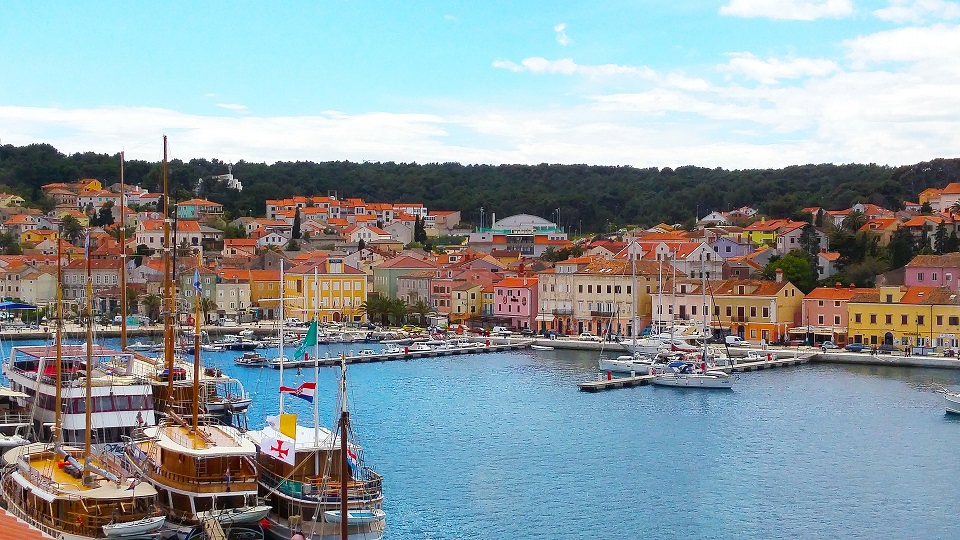
Mali Lošinj
Most Guest Overnights on Island of Krk
Among the subregions, the island of Krk is in the lead, with an increase of 1% and 7 million overnights (and has a 36% share of total overnights in Kvarner).
The Crikvenica-Vinodol Riviera ranks second (3.2 million) followed by the island of Losinj (2.4 million). The number of overnight stays continues as follows: the Opatija Riviera and the island of Rab (2.2 million), the island of Cres (1.1 million), the Rijeka area (925,000) and Gorski Kotar (110,000). The highest percentage increase in overnight stays (14%) was recorded in the Rijeka area.
Mali Losinj (2.4 million nights) and Crikvenica (2.2 million nights) are among the "best" destinations.
Guests Prefer Croatia Family Accommodations
Family accommodations accounted for 40% of recorded overnight stays (7.7 million). Campsites and hotels recorded almost the same number of total overnights: 3.7 million each with individual shares of 19%.
The highest increase in overnights was recorded in upper-category accommodations:
- Hotels generally realized 1% more overnights. However, 4 and 5-star hotels enjoyed a 6% increase.
- All family accommodations experienced a 1% increase in overnight stays, but 5-star family accommodations enjoyed a 38% increase!
- A similar scenario applies to campsites: there was an overall 1% decrease in overnight stays, but overnights at 5-star camps are up 22%.
Regardless of the type, 5-star facilities have seen 15% increase in overnight stays during the past year and 70% increase overnight over the last 3 years!
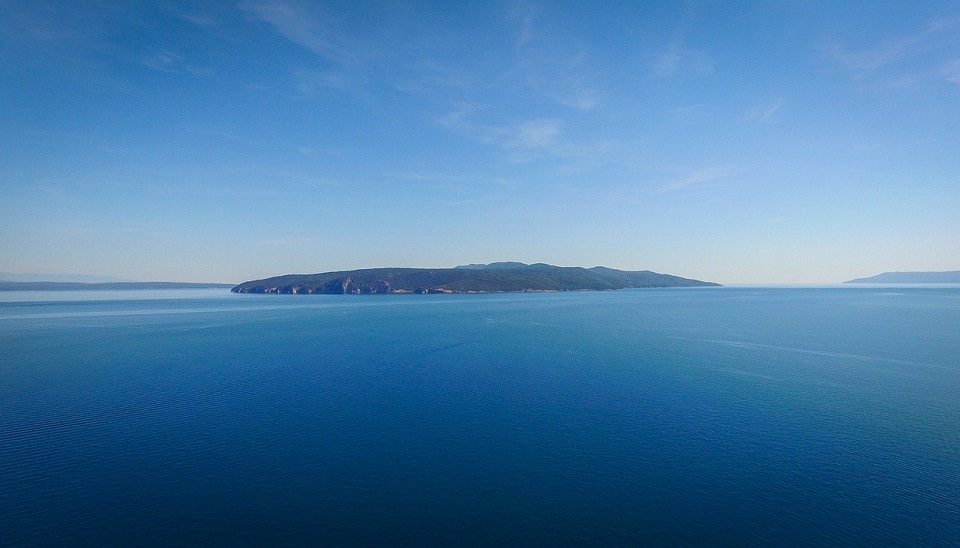
Cres
Nautical Tourism Overnights Up Thirty-Two Percent
These figures do not include 24,500 arrivals and 156,000 overnight stays due to nautical traffic, which in has increased by as much as 32% the last year alone. There are about 20 nautical tourism ports in Kvarner, and Marina Punat alone accounts for more than half of nautical overnights.
Kvarner Third to Istria and Split-Dalmatia in Accommodation Capacity
As of 2019, there are 190,000 permanent beds available for tourists in Kvarner which represent a 17% share in accommodation capacity within Croatia. The Kvarner region ranks third in terms of total available accommodation, which is behind Istria and Split-Dalmatia counties in Croatia.
Irena Peršić Živadinov, Director of the Kvarner Tourist Board, emphasizes that the primary goal is to strengthen the pre and post-seasons, because one cannot always count on a record “peak” season.
Kvarner Tourist Board Expects Long-Term Increase
“In recent years, the Kvarner region has definitely succeeded in strengthening the pre and post-seasons. Compared 2010 to 2019, we have seen a huge increase in overnight stays during both seasons - almost 90%! Over the past 10 years, we have invested in the quantity and quality of the regions’ offerings. We have also focused on joint branding and activities and recognized our strengths regarding products and offerings."
“These steps probably won’t yield immediate results but will take a longer time to have an effect. Taking that into consideration, for example, 12.7 million overnight stays were recorded in 2010, it is clear that in a period of 9 years we have realized 6.3 million more overnights, or the total number of overnights in Kvarner ha increased by almost 50%,” Peršić Živadinov points out.
Follow our Travel page to keep up-to-date on tourism trends in Croatia.


